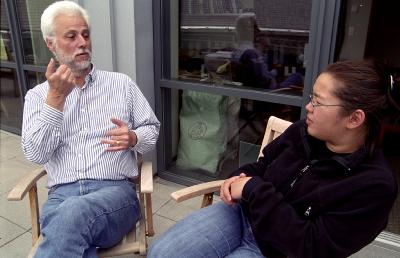In a way, Richard Ladner inherited his volunteer interests.
The hearing son of deaf parents, the UW computer science and engineering professor has donated considerable time to the deaf community for the last 24 years. But it was a legacy he didn’t pick up until long after he’d left home and started a career of his own.
That’s when he started to talk to his parents in their language for the first time.
“I didn’t learn sign language growing up,” Ladner said. “That was in the age of oralism, when all deaf people were encouraged to speak and to read the lips of hearing people instead of sign. There wasn’t the recognition of signing as a language then, or the encouragement to learn it.”
So, both his parents spoke. His father hadn’t become deaf until the age of 4, so he had already learned to speak, Ladner explained, and his mother — deaf from 6 months — learned to speak and read lips. Both parents used American Sign Language as well, and taught at the California School for the Deaf in Berkeley, but only one of their four children — Ladner’s older sister — learned how to sign.
That made her the interpreter for the family, especially between Ladner’s father and his kids because he didn’t read lips. But at the time there was no thought of teaching all the children sign language.
“In those days, deaf parents just wanted their hearing kids to be like other kids,” Ladner said.
And indeed, his parents succeeded at that. Ladner said he didn’t really feel “different” until adolescence, when he began to take notice of the difficulties his parents encountered in the hearing world.
Still, when he left home, not speaking sign language and with no deaf friends, he wasn’t really anticipating connections to the deaf community.
It was in 1980, when Ladner was early in his career at the UW, that he began to reconsider learning to sign. His parents were getting older, and he wanted to be able to communicate with them more fully.
“Knowing the power of language, it became more important to me,” he said. “Having a common language between people is incredible. I think that goes across cultures. If my parents spoke Japanese, it would be the same thing.”
So Ladner enrolled in American Sign Language classes at Seattle Central Community College. And although it was easier for him to learn because of his early exposure to his parents and their friends, he still found the language challenging. He said that’s because you use your eyes to receive it and hearing people are not used to doing that. Even today, he claims his fluency is only “moderate.”
“I have a hard time with finger spelling and colloquialisms,” he said.
Ladner’s fluency was challenged a few years later when he applied for and received a Guggenheim fellowship to teach at Gallaudet, the only university in the country that is primarily for the deaf. He was teaching the theory of computation, which requires the use of mathematical concepts.
“There are signs for technical terms in classes like calculus, but not for something like this,” he said. “I had to work with the students to invent some signs to use.”
But he enjoyed the experience. Gallaudet was his parents’ alma mater, so he’d heard about it for years. He’s returning to the school this month to see a friend receive an honorary degree.
The friend is Marilyn Smith, who was one of Ladner’s first sign language teachers, and also a person who recruited him to several volunteer causes.
“I did some fund raising for the American Association of the Deaf Blind convention that was here in Seattle in 1984,” Ladner recalled. “I was on a committee that worked on that. It was quite exciting.”
More recently, he’s become involved with fund raising for the Abused Deaf Women’s Advocacy Services (ADWAS). As its name implies, this is an organization that helps abused women who are also deaf to get out of their abusive situations. Domestic violence is a particular problem for deaf women, Ladner said, because these women are likely to feel isolated. If they go to a regular domestic violence agency, there may not always be an interpreter available to help them communicate.
Right now, ADWAS is trying to raise $7.6 million to build transitional housing that will be run by the YWCA. When completed, the facility will be the first of its kind in the nation. Ladner is a co-chair of the steering committee for the capital campaign.
Except for his stint at Gallaudet, Ladner’s interest in deaf concerns hasn’t intersected much with his career. As a theorist (his degree is in math), he isn’t usually involved with technological advances that can help the deaf, although back in the 80s, he worked on an IBM project to develop a network for the deaf-blind using Braille displays and large print.
And now another possibility is in the offing. “A couple of my colleagues came to me with the idea that we should try to do data compression for video over cell phones,” Ladner said. “Video already exists for cell phones but it’s low quality. What we’d like to do is work on higher quality.”
High quality video would permit signing over the phone. The group has applied to the National Science Foundation for a grant to fund the project.
In the meantime, Ladner continues to work on ADWAS fund raising and lobbies hard to get the UW to offer classes in American Sign Language.
Currently, the University accepts American Sign Language as a foreign language for admission and for graduation but doesn’t offer the language itself.
It’s not surprising Ladner would be passionate about sign language. He still remembers the emotional day he went home and used the language with his parents for the first time.
“It cemented a bond between us that hadn’t really been there before,” he said.
